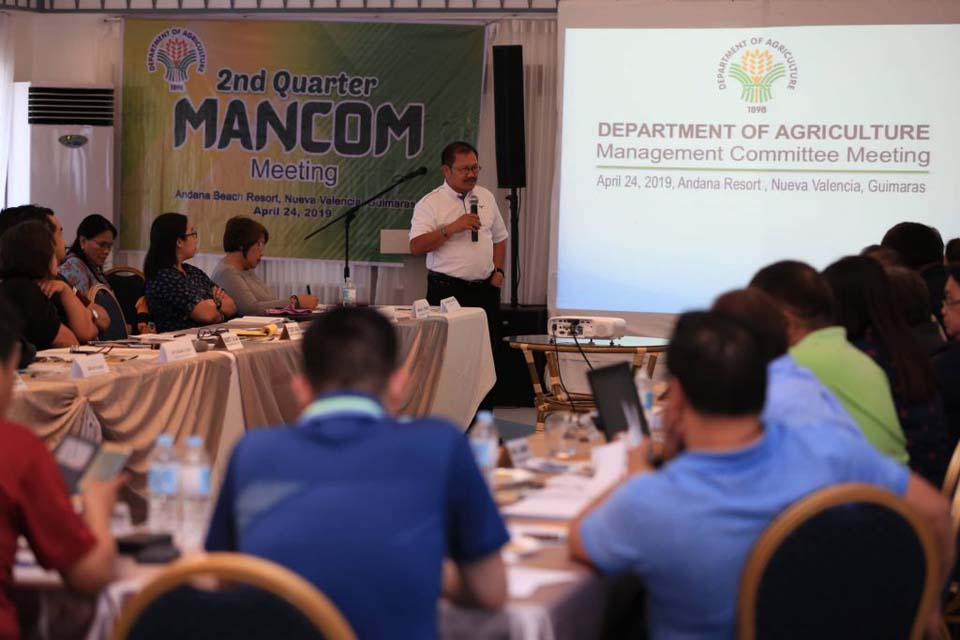
NUEVA VALENCIA, Guimaras— Department of Agriculture (DA) Secretary Emmanuel F. Piñol had given new policy directions to the executives of the different bureaus and agencies under DA during the Second Quarter National Management Committee (ManCom) meeting held on April 24 in Nueva Valencia, Guimaras.
“We have so many things to do with so little time,” stressed Piñol.
He went on urging the Undersecretaries, Assistant Secretaries down to bureau and regional directors to focus and concentrate on their respective works and mandates.
“When I assumed office [in 2016], I said, let us go back to the basic mandate of the Department of Agriculture and that is to produce food for the country. But in addition to that, we also have to make sure that the producers of food—the farmers and fishermen—are also lifted out of poverty,” Piñol told.
He assured that the Philippines will achieve rice self-sufficiency given that the DA is providing the three basic elements—good seeds, irrigation and fertilizer—needed by the farmers.
As such, he is banking on the P10 billion per year Rice Competitiveness Enhancement Fund (RCEF) from the tariffication system, and P7 billion from the regular fund to achieve the required sufficiency production volume of 21 million metric tons of palay.
The rice production dropped from 19.28 million metric tons in 2017, the highest production yet, to 19.05 million metric tons last year due to the series of typhoons. However, Piñol cited that these figures have significantly increased from the 17.6 million metric ton volume in 2016.
“I still believe and deeply convinced that we will be able to achieve rice sufficiency, why? Because right now, ang adoption rate ng ating hybrid at inbred seeds is only 60 percent. [But] we are already hitting 19 million metric tons,” said Piñol who went on emphasizing that the use of hybrid seeds could generate an additional two million metric tons of palay production.
The DA will utilize P3 billion of the RCEF for the procurement of good seeds which will be given for free to the farmers. According to Piñol, 1.2 million hectares of farmlands will be planted to good seeds and additional 600,000 hectares to hybrid rice.
He added that the inter-agency committee had already approved the Israeli government’s proposal to fund the establishment of 6,200 units of solar-powered irrigation systems nationwide which will irrigate about 500,000 hectares nationwide.
DA will sit down with the heads of the Bureau of Soils and Water Management, National Irrigation Administration, National Economic Development Authority, Department of Finance, and Department of the Interior and Local Government on April 30 to draft the National Irrigation Plan.
The agri chief also mentioned that DA obtained concession with a private firm connected to the Russian government to extend fertilizer loans of about P30 billion to Planters Products Inc.
Although the rice industry is being given emphasis, Piñol reiterated that DA will not abandon other programs.
The DA Secretary called for the introduction of sorghum as a complementary crop to corn in order to boost the local hog and poultry industries.
Sorghum is a drought-tolerant crop that only requires 35 percent of the water needed by corn. Aside from the feed grain, sorghum can also be processed into silage. About 17 to 20 metric tons of silage per hectare can be produced which would be enough to feed 20 cattle every year.
According to Piñol, like coffee and cacao, sorghum shall be intercropped with coconut.
He also underscored the need to improve the DA’s dairy program. “We will implement the dairy program in a module farm, 6,000 heads, commercially-operated, owned by the farmers, to be initially operated by technical people,” he said.
With that, there will be about 24,000 milking cows in the country by 2022.
DA also linked farmers’ produce to global markets. “Today, we have also identified exportable products like coconut, mango, pineapple, banana, abaca, and fish. We will focus on these [commodities] and will facilitate its export,” said Piñol.
The DA chief lauded the High-Value Crops Development Program for making onion supply sufficient for household use. From the 45 percent sufficiency level, local farmers had able to produce 70 percent of the national requirement for onions.
“We only need 30 percent para maging independent tayo at wala ng onion cartel,” he stressed.
Piñol said that the P40 million worth of cold storage facilities are what farmers need to store up to 300,000 bags of onion.
The agri chief also instructed the Bureau of Fisheries and Aquatic Resources to focus on the local production of fish by establishing cold storage and fish cages and reactivating the hatcheries.
In addition to that, DA is working on to improve the income and productivity of coconut farmers.
Piñol said that he had recently convinced the Department of Education (DepEd) to use coconut water as the “official energy drink” in the national games. Another collaboration with DepEd, according to him, is the MerienDAhan sa Paaralan which aims to encourage farmers to go on processing and marketing their produce in schools. The program also seeks to address the problem of malnutrition.
“From the very beginning of this administration, we have already started building the foundations of an agricultural program that will transcend political terms and will go on with continuity,” he remarked. ### (Sheila Herradura, DA-RAFIS 6)













